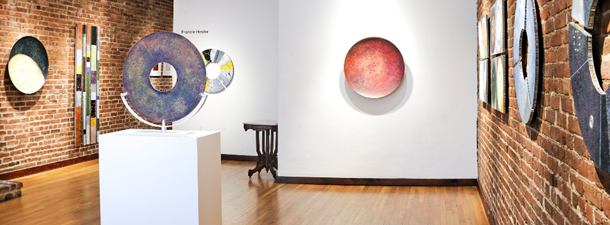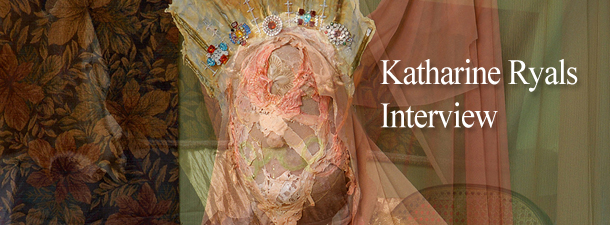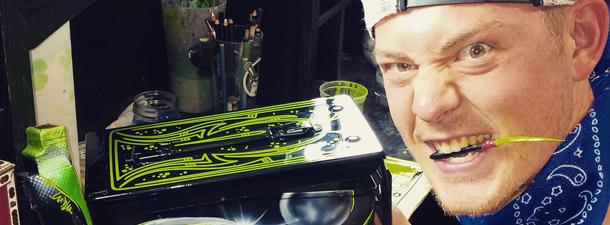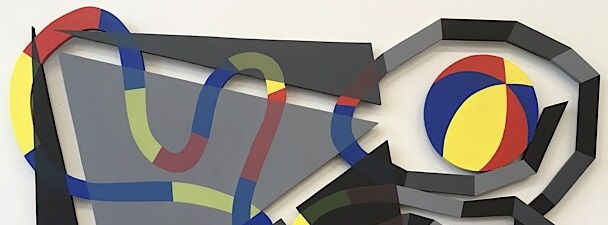Interview With Artist Oliver Ray
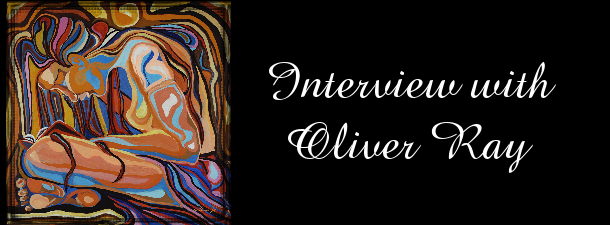
I received an article submission titled “Ten Tips for Buying Art – and Getting the Best Bang for Your Buck!” on my TipzTime.com website from artist, Oliver Ray. I browsed through his online art gallery and really enjoyed his work. I wrote him to see if he would like to do an interview and share his story. He has agreed to…
[Wendy Shepherd] Have you always wanted to be an artist?
[Oliver Ray] Almost my whole life. Until I was 12, I really wanted to be a cowboy (or cop), but after that, I was definitely most interested in art.[Wendy] What other types of things do you love to do?
[Oliver] Landscaping and renovations! Christie and I bought our first house two years ago. It’s a real fixer-upper but we’ve really enjoyed transforming it. Outside we’ve created different gardens and planted a variety of trees. Inside we’re in the process of enlarging my studio space…we hope to end up with a 1200 square foot open studio area with lots of light.[Wendy] What is the funniest painting you have ever done?
[Oliver] Funniest? I’m sure many critics might find my work funny, although I don’t intend it to be. In high school I used to draw caricatures of my teachers, which my friends and I found quite funny (although the teachers in question usually felt differently!)[Wendy] Did any particular books influence the way you learned art?
[Oliver] My extended family is filled with professional artists and art lovers, so I have always had access to a huge library of art books- both instructional and reference.There was a set of books I remember in particular. They were published in Britain in the 60s and each one offered a brief biography and displayed the most famous works by a master artist (from Rembrandt to Dali). I remember using these books to try and reproduce certain techniques as a young boy.
[Wendy] What tools do you use when painting and why?
[Oliver] I use all the usual oil painting materials. My technique, though, is pretty rough, so I use the mid-grade, synthetic brushes that can take a lot of abuse. I also like to paint on masonite (hardboard) from time to time. It isn’t as sensitive as canvas and can take a lot more pushing, poking and scraping.[Wendy] Is there anything in particular that influences what you paint?
[Oliver] The Austrian expressionist Egon Schiele and his mentor, Gustav Klimt have always impressed me. Their use of color and exaggerated forms greatly influenced the development of my current style.[Wendy] You attended the University of Northern British Columbia. Did you intend to make art your career?
[Oliver] Definitely. Art doesn’t require regular hours, so you can experience a lot of what life has to offer and still pursue your artistic goals. In fact, I would argue that your art only benefits from increased exposure to different things…different opportunities.UNBC is also one of the newest, highest ranked schools in Canada, so I was ecstatic when I received the acceptance letter. Although my degree is not in Fine Arts, I think the experience helped me develop as a person and, in turn, as an artist.
[Wendy] Were you able to afford to go to the University yourself or did you get financial assistance or a grant?
[Oliver] I managed to work during the summers to help pay for tuition, but did receive a government student loan. Canada has some excellent loan programs to ensure equality of access to most potential students…regardless of their income.[Wendy] Is there anyone in particular that you admire in the art world?
[Oliver] Tom Thomson. He is perhaps the most famous Canadian artist to date. Not only do I love the raw, spontaneous and impulsive way he portrayed our country’s landscape, but I also admire the way he lived his life. He didn’t start painting full-time until his early 30s, and chose not to pursue a formal fine arts education. Instead, he took his paint box into the wilderness (usually via canoe) and employed his own technique to depict what he saw. His work, which didn’t incorporate any of the European styles that were popular at the time, was the first to be called truly “Canadian”.[Wendy] Is there anyone whom you would like to meet?
[Oliver] Robert Bateman. He is probably the most commercially successful living artist in Canada. What I admire most is that he built his career entirely outside of the mainstream art world. In fact, sadly, many critics have still not recognized the artistic value of his realistic, wildlife paintings. In my mind, though, his are the most beautiful paintings in that genre, and have been for the past four decades.He is probably in his seventies now, and I’m sure he gets many requests to meet with young artists. Who knows…maybe I’ll send him a letter. .
[Wendy] Do you think there is a lot of competition in the art industry?
[Oliver] Artists by nature are not very competitive. Having said that, there are definitely more full-time artists selling their wares now than ever before, but there are also many styles and genres to accommodate us. The Internet has really helped transcend regional boundaries and allows artists to access collectors on a much wider scale. In short, the number of artists has increased, but the number of “art consumers” has increased at a higher rate.[Wendy] Is it hard to get your artwork displayed in art galleries? Do you need an agent or manager?
[Oliver] It’s very difficult. Most of the artists I know who work with professional dealers have had to do a lot of leg work before getting representation. Quite often, only 5% – 10% of the galleries you approach will actually agree to carry your work.I prefer to stay independent, selling my work personally and through my online studio. It’s a lot of work, but I get to maintain control of my career.
[Wendy] How many art shows do you tend to do each year? How many paintings?
[Oliver] All of my exhibiting is online. The people I want to reach don’t really go to art shows (or galleries for that matter). My goal when I set up my online studio was to access people who enjoy art, but might not necessarily care for a gallery setting.As for paintings, I probably finish two each month, on average.
[Wendy] Do people tend to be more interested in your original paintings or your prints?
[Oliver] Thankfully, my prints have become very popular. It helps that they are relatively inexpensive and don’t require framing. By being a self-representing artist, I’ve been able to keep my costs down (galleries often take a 50% commission on the art that they sell). I also limit the amount of prints I make for each original painting to 100, which seems to attract collectors.[Wendy] Would you ever consider illustrating a book?
[Oliver] Absolutely! I would especially love to illustrate a children’s book. Picasso said that, “Every child is an artist. The problem is how to remain an artist once he grows up”. I think the art children see is just as important as the words they read. It nurtures creativity.[Wendy] What is it you wish to convey through your paintings?
[Oliver] At the risk of sounding artsy-fartsy, my main goal is to paint human emotion. Usually, I try to express what I think a particular subject might be feeling, whether it’s a musician trying to strike that perfect note, or two lovers looking into each other’s eyes.[Wendy] What types of things do you do to promote your artwork?
[Oliver] Network, network, network. Wherever I go, I always make sure I have a fistful of business cards in my pocket and I present one (or several) to every new acquaintance I make. It sounds cheesy, but it’s the least expensive, most effective way to meet potential collectors. I find that people like to know as much about the artist as the art itself.[Wendy] Do you have any advice for people interested in making art a career?
[Oliver] A good plan is paramount. It’s safest to build up a hefty body of work before setting out to make art your only source of income. At first, you won’t have time to paint. You’ll have to dedicate every waking hour to promoting yourself. It’s also best to have an avenue in place to sell your work (i.e. a website or gallery). Once you’ve established that beachhead (and made some sales), you can more safely drop everything and dive in.Above all else, my advice would be to trust that you can be successful. Shakespeare said it best: “Our doubts are traitors, and make us lose the good we oft might win, by fearing to attempt”.
[Wendy] Thank-you for sharing your story, Oliver. I look forward to seeing more of your art in the near future.
– You may be interested to read more about Oliver Ray and his fine artwork listed on his website. You will also find numbered prints of his art. To visit Oliver Ray’s website » Click Here
(This interview was originally done for Dreamish by Wendy Shepherd)
